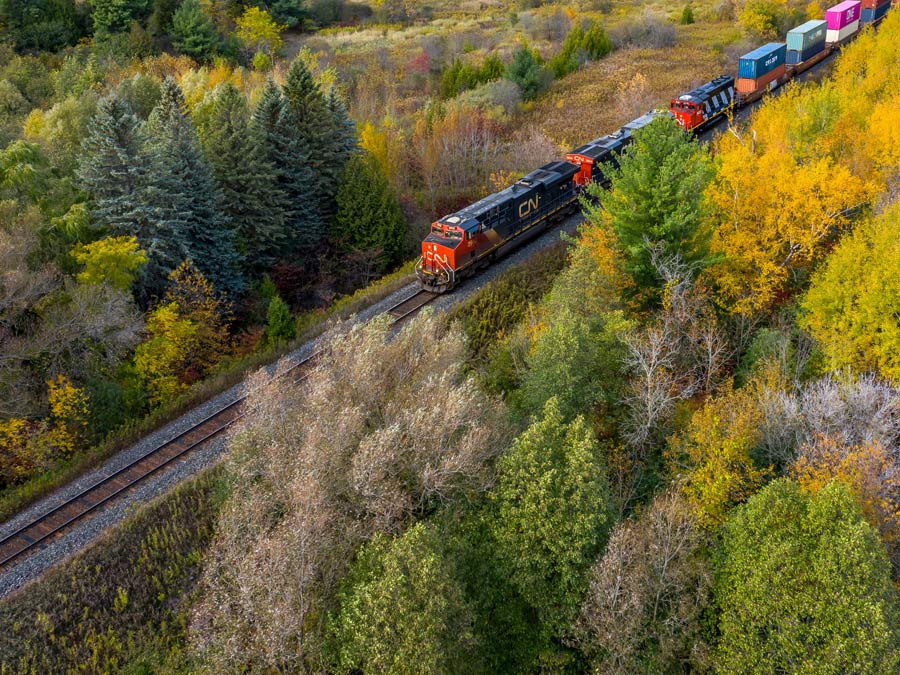What happens when the trains stop moving? Unfortunately, this is a reality we have been facing recently since the CN/CPKC railway strike kicked off, and the impact is already being felt far and wide. This isn’t just another disruption; it’s a significant event that’s hit us right at the heart of how goods move across Canada. Let’s break it down so we can better understand what led to this strike, how it’s affecting the economy, and what it means for our industry.
The Big Picture: How We Got Here
On August 22, over 9,000 rail workers found themselves locked out by Canadian National Railway (CN) and Canadian Pacific Kansas City (CPKC). This wasn’t some sudden decision made overnight—it’s the result of a long buildup of tension between the rail companies and their workers, represented by the Teamsters Canada Rail Conference (TCRC). The key sticking points: Wages, benefits, and work schedules. Rail workers are pushing for better pay and working conditions, which includes more reasonable schedules and rest periods. Understandably, working long and unpredictable hours has become a hot issue. On the other hand, CN and CPKC feel they’ve made fair offers that address these concerns, but no agreement was reached. So, the lockout began, and with it, the train engines stopped.
Why Should Dealerships Care?
As soon as the strike started, the ripple effects spread fast. For dealerships, this translates into delays in receiving new vehicles and critical parts. Canada’s railways are responsible for moving an enormous amount of freight across the country. When that stops, the pipeline of goods stops too. Whether you’re waiting on that much-anticipated new model to arrive or crucial parts for repairs, the disruption is likely causing headaches. After all, a delay in the supply chain can lead to lost sales, frustrated customers, and a lot of scrambling to find alternative solutions. And that’s just the beginning. The longer these disputes drag on, the more the backlog builds, affecting every part of the business.
The Economic Toll
It’s not just dealerships feeling the pinch. Moody’s estimates that this strike is costing the Canadian economy up to $341 million every single day. For industries that rely on the steady movement of goods, like agriculture, manufacturing, and yes, automotive, this kind of stoppage can be devastating. Take the Western Grain Elevator Association as an example. They’ve reported that every day the railways are down, they’re losing between $55 million and $66 million in sales. That’s just one sector. Multiply that across the entire economy, and you get a sense of how big this problem is.
Government Intervention: Binding Arbitration
With so much at stake, it didn’t take long for the federal government to get involved. Under Section 107 of the Canada Labour Code, they called for binding arbitration, meaning the Canadian Industrial Relations Board will step in to resolve the dispute. On Monday, August 26, workers were ordered back on the job. But this move hasn’t come without controversy. The union is challenging the ruling, arguing that binding arbitration bypasses the usual process of debate and back-and-forth negotiation. It’s a decision that raises questions about how future labor disputes might be handled, especially in other federally regulated industries like airlines and postal services.
What Comes Next?
For dealerships, the takeaway here is to stay flexible and informed. This strike is just another reminder of how interconnected our industries are, and how fragile that connection can be. While the trains are back in motion for now, the underlying issues haven’t been fully resolved. There could be more bumps in the road ahead, especially if the union’s legal challenges gain traction. Looking forward, it’s worth considering how you can prepare for potential disruptions in the future. Keeping alternative shipping methods in mind or staying on top of the latest developments can help you avoid getting caught off guard next time. And there will be a next time—these kinds of labor disputes are a reality in industries that keep the country running.
Whether we’re dealing with a rail strike or another challenge, it’s about adapting and finding ways to keep moving forward. We’re no strangers to overcoming obstacles, and this is just another curve in the track that we’ll navigate together.


